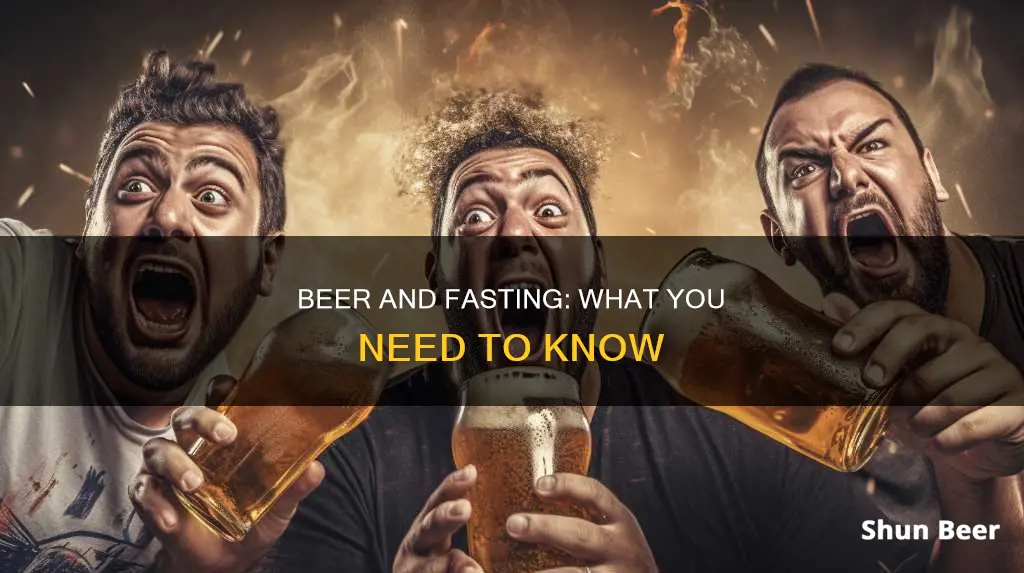
Drinking alcohol while fasting is a tricky topic. It depends on the type of fast and the amount of alcohol consumed. Generally, it is advised to avoid drinking alcohol during the fasting window as it can break the fast and hinder the benefits of fasting. However, drinking in moderation during the eating window is usually acceptable.
When it comes to beer specifically, it is important to consider the calorie and sugar content. Beer is typically high in both, which can impact the effectiveness of the fast. Additionally, alcohol can affect insulin sensitivity, fat oxidation, and autophagy, which are crucial processes for weight loss and overall health.
In conclusion, while an occasional beer during the eating window may not significantly impact fasting goals, excessive consumption or drinking during the fasting window can undermine the benefits of fasting and have negative health effects.
| Characteristics | Values |
|---|---|
| Can you drink beer when fasting? | Yes, but only during the eating window. |
| Can you drink alcohol when fasting? | Yes, but only during the eating window. |
| Can you drink alcohol with an empty stomach? | No, it is never a good idea. |
| Can you drink alcohol during the fasting window? | No, it is unhealthy and unsafe with no food in your system. |
| Can you drink alcohol during intermittent fasting? | Yes, but only during the eating window. |
| Is drinking alcohol during intermittent fasting unhealthy? | Yes, it can impede weight loss, disrupt your sleep cycle, and make it more difficult to stick to your fasting plan. |
| Is drinking alcohol unhealthy in general? | Yes, it can hinder weight loss, trigger inflammation, and damage DNA. |
What You'll Learn

Drinking beer during a fast breaks your fast
Drinking beer or any other alcoholic beverage during a fast will break your fast. This is because alcohol contains calories, and to experience the full benefits of fasting, you need to avoid consuming anything other than water and sometimes black coffee or herbal tea.
Alcohol and fasting
Fasting is the practice of abstaining from food and drink for a specific period. It is often done for health reasons, such as weight loss, improved mental clarity, and increased longevity. Intermittent fasting, a popular form of fasting, involves alternating periods of eating and fasting. During the fasting period, you are supposed to avoid all foods and beverages.
Alcohol and its effects
Alcohol is a toxin and is linked to short-term and long-term health risks. It is calorie-dense, with 7 calories per gram, which is more than carbohydrates and proteins. Alcohol also inhibits fat oxidation, resulting in higher body fat in the long term.
Alcohol and intermittent fasting
If you are doing intermittent fasting, it is best to avoid drinking alcohol during your fasting window. Alcohol will break your fast and hinder your fasting goals. It can also lead to impaired decision-making and increased hunger, making it more challenging to stick to your fasting goals.
However, this does not mean that you have to give up alcohol completely while intermittent fasting. You can drink alcohol in moderation during your eating window. It is recommended to limit your alcohol intake to one drink per day for women and no more than two drinks per day for men.
Alcohol and weight loss
If you are doing intermittent fasting for weight loss, it is important to note that alcohol may lead to overeating and craving less nutrient-dense foods. Alcohol can also stimulate your appetite and lead to increased hunger, making it more challenging to stick to a calorie deficit.
The Magical Math of 79 Beers: Age Subtraction Mystery
You may want to see also

Beer is calorie-dense
Beer is a calorie-dense drink. One gram of alcohol contains 7 calories, which is a little more than a gram of sugar and a little less than a gram of fat. This means that you cannot drink beer during your fasting window. The average beer is 153 calories, and these calories are considered empty calories, providing no nutritional benefits.
Beer is also not recommended for those who are gluten-sensitive, and even small amounts can be more damaging than beneficial. In addition, beer can contain many calories and sugars, which can sabotage weight loss efforts. A consistent high-calorie intake will hinder weight loss goals.
However, beer does contain polyphenols, which are plant composites that offer health benefits such as antioxidant properties. These polyphenols can neutralise the harmful effects of free radicals, which are linked to an increased risk of illness and disease. Darker beers, such as red wine, provide the most polyphenols.
Although beer is calorie-dense, moderate intake may not negatively impact health. According to some studies, moderate alcohol consumption can reduce the risk of heart disease, inflammation, blood clotting, and high blood pressure.
Drinking Beer on Twitch: What's the Verdict?
You may want to see also

Beer is not keto-friendly
The average beer contains around 150 or more calories per 12-ounce serving, along with a significant dose of alcohol. The high carb count in beer—often over 10 grams of net carbs per serving—can quickly eat into your daily carb limit on a keto diet.
Beer also disrupts your body's ability to burn fat. When you consume alcohol, your body prioritizes metabolizing it over burning fat. This is because alcohol is toxic and cannot be stored in the body. As a result, your body's energy sources are directed towards processing the alcohol, leading to a shutdown of gluconeogenesis, accumulation of lactate, and increased synthesis of fatty acids for storage. This can cause hypoglycemia and lactic acidosis, substantially disrupting your metabolic health.
Furthermore, the combination of alcohol and carbs in beer can lead to adverse effects on the body when consumed in excess. These effects include hypoglycemia, liver damage, a build-up of fat in the liver, digestive issues, inflammation, heart problems, and reproductive issues, among others.
While there are some low-carb beer options available, it's important to remember that even these options can slow your progress if consumed in large quantities. Therefore, it's crucial to drink alcohol in moderation, regardless of the type of beer you choose.
The Magic of Appearing Beer: Trick Explained
You may want to see also

Alcohol can impede fat burning
Secondly, alcohol can affect your blood sugar levels, causing them to drop. As a result, your body tries to rebalance its blood sugar, leading to increased appetite and food cravings, particularly for foods that will quickly raise your blood sugar, such as low-fibre starches. This can result in increased calorie consumption and weight gain.
Thirdly, alcohol affects your sleep. It can disrupt your sleep cycle and prevent you from getting the deep, restorative sleep you need. Sleep deprivation can lead to an imbalance in hormones related to hunger, satiety, and energy storage, further impeding fat burning.
Finally, alcohol can negatively impact your digestion and nutrient absorption. It can cause stress on the stomach and intestines, leading to decreased digestive secretions and reduced movement of food through the tract. This can affect your metabolism and make it more difficult for your body to break down and absorb nutrients, including fats.
Beer and Diarrhea: What You Need to Know
You may want to see also

Alcohol can cause dehydration
Drinking alcohol can cause dehydration, especially when consumed in large quantities. Alcohol is a diuretic, which means it increases the amount of urine produced by the body. This can lead to a loss of fluids and electrolytes, resulting in dehydration. The risk of dehydration is greater when drinking on an empty stomach, as the alcohol is absorbed directly into the bloodstream instead of being absorbed more slowly through the stomach and small intestine.
To prevent dehydration when drinking alcohol, it is important to consume it in moderation and to drink water alongside alcoholic beverages. It is also recommended to drink slowly and to be aware of the symptoms of dehydration, such as increased thirst, dry mouth, and dark-coloured urine.
However, it is important to note that some sources dispute the claim that alcohol causes dehydration. These sources argue that while alcohol may initially increase urine output, subsequent drinks do not lead to further increases in urine production. Additionally, they claim that the assumption of alcohol-induced dehydration is based on outdated research and that modern scientific literature does not support this idea.
Drinking Alcohol While Intermittent Fasting
When it comes to drinking alcohol during intermittent fasting, it is generally advised to avoid consuming alcohol during the fasting period as it contains calories and will break the fast. However, drinking in moderation during the eating window is usually considered acceptable. It is important to be mindful of the potential impact on weight loss efforts, as alcohol can hinder progress and increase calorie consumption.
Beer and Eye Problems: Is There a Link?
You may want to see also
Frequently asked questions
Yes, you can drink beer while fasting, but only during your designated eating window.
Drinking beer will break your fast as it contains calories. It may also negatively impact your fasting goals by hindering weight loss and fat burning, and causing dehydration, poor sleep, and increased hunger.
Yes, water, black coffee, and herbal tea are all calorie-free options that won't break your fast.
It is recommended to limit your alcohol consumption to small amounts and avoid binge drinking. Stick to one standard drink or less to minimize its impact on your fast.







